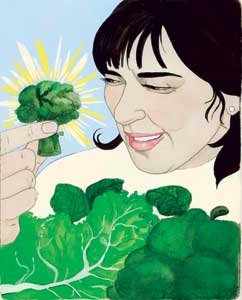 |
 |
| Illustration by Lara Tomlin |
K is for kale
The vitamin Sarah Booth knows best is the one you probably know the least about. Booth, an associate professor at the Friedman School of Nutrition Science and Policy and director of the Vitamin K Lab at the Jean Mayer USDA Human Nutrition Research Center on Aging (HNRCA), gave David Brittan some food for thought.
What is vitamin K good for?
It's important for blood clotting. It's also important for bone health, possibly in delaying osteoporosis. There are certain proteins that bind to the calcium in bones, and vitamin K promotes that binding process. Those are the roles we can be sure about, anyway.
What foods have it?
Vitamin K is abundant in green leafy vegetables. The greener the vegetable the more vitamin K, because vitamin K is involved in photosynthesis. The vegetables that stand out are spinach, kale, and collards. But broccoli is also a great source of vitamin K. Also peas and dark green lettuce.
How much vitamin K do people need?
For blood clotting, you get enough of it from an ordinary diet. If you eat half a cup of broccoli you've met your daily requirement. But we don't yet know how much vitamin K one needs for bone health.
I looked at the nutritional labels on all of my vitamin-fortified breakfast cereals this morning, and vitamin K was nowhere to be found.
The reason you don't see it in many supplements is that some people take the blood-thinning drug Coumadin, which works by interfering with vitamin K. There is concern in the supplement industry that if they add vitamin K, someone on Coumadin might unwittingly counteract the blood thinner. But nobody really knows how much vitamin K a supplement would have to contain to work against the Coumadin. Supplements that do contain vitamin K are targeted mainly to postmenopausal women to prevent bone loss.
How much is too much?
There is no known case of vitamin K overdose. That may be partly because the body is very adept at either utilizing the vitamin K or excreting it. But there may be another reason. With other micronutrients—such as the carotenoids, vitamin E, and vitamin A—there have been more opportunities to study subtle effects of long-term oversupplementation. Because vitamin K is not supplemented at very high levels, we may not be in a position to detect subtle harm.
What's the biggest thing we still don't know about vitamin K?
I'm starting to wonder if it could have a lot more roles than we have traditionally ascribed to it. That turned out to be true of vitamin A. Scientists here at the HNRCA have discovered ways that carotenoids are involved in gene expression, signaling, et cetera. The ramifications of that work extend well beyond our classic concept of what a nutrient does. Now scientists of various disciplines are examining the possible roles of vitamin D in preventing cancer and diabetes. I could see similar discoveries being made about vitamin K.
And you're working on it?
We're slowly going in that direction, but we don't have a critical mass of scientists studying vitamin K. There are about 80 vitamin K researchers in the world, mostly focused on the role of vitamin K in hematology. In nutrition, there are about half a dozen researchers worldwide. If more
people get interested in it, vitamin K could turn out to have pivotal roles we haven't yet identified.
Can you share some of your favorite broccoli recipes?
Me? You're talking to someone who doesn't cook.
|

